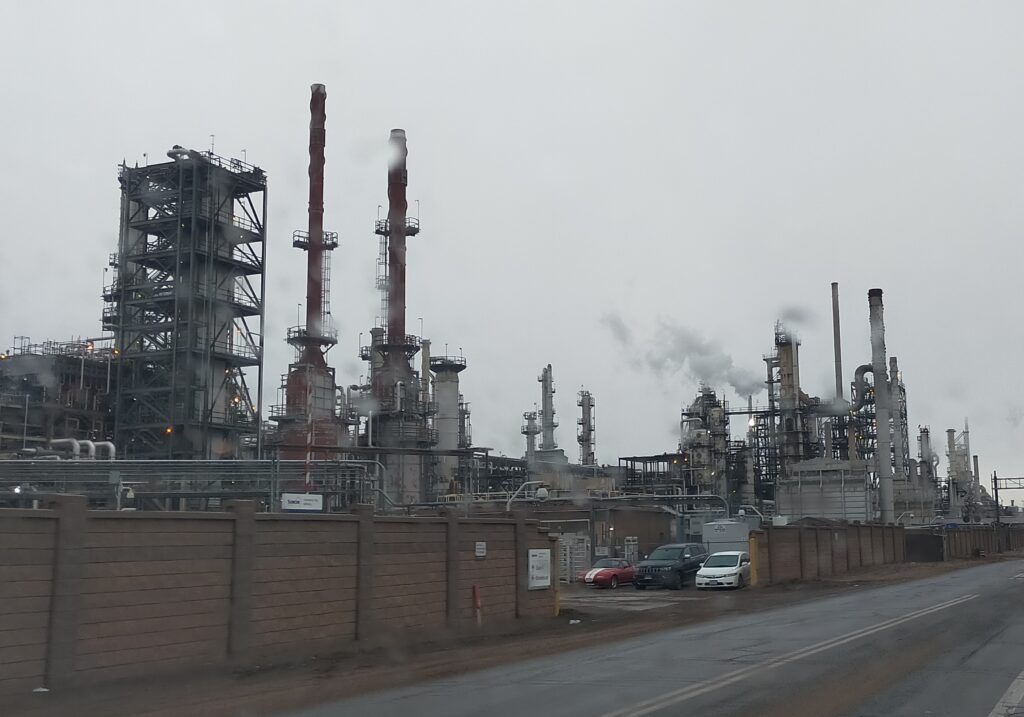
Photo by Konrad Flæte Gundersen
By: Konrad Flæte Gundersen
______________________________________________________________________________
COMMERCE CITY — Ean Thomas Tafoya is fighting for environmental justice for low-income north metro Denver residents living in pollution from factories, including a Purina pet food factory and a Suncor oil refinery.
The air here reeks with the odor of warm cat food. It’s a pungent, nauseating smell. The aroma wafts from the Purina factory, one of many factories operating amid neighborhoods where residents live in small houses and trailers.
On a recent cloudy afternoon, it was hard to tell where the factory emissions ended and where the clouds began. It was gray, the color of many homes in the area, though some seem to have been due for a paint job a decade ago. Some of the houses are dilapidated with boarded up windows. This contrasts sharply with the airy pastel mini mansions of Denver’s more affluent suburbs.
Tafoya wants to improve the environmental living conditions for the people living here by pressing for environmental justice – working both inside and outside the government.
‘’I grew up here. These are my people,’’ he said during an interview in the Denver Public Library’s Valdez-Perry branch.

Photo by Konrad Flæte Gundersen
Tafoya is a Chicano man who was raised here in Commerce City. He’s a tall, burly man with long hair that he keeps pinned up in a bun, showing off his earrings.
He serves as the Colorado state director for GreenLatinos, a Latino environmental advocacy group. He’s also a co-chair of the Colorado Environmental Justice Action Taskforce, a group within the Colorado Department of Public Health and the Environment. He previously worked in the administration of Denver’s former Mayor Michael Hancock.
Growing up within industry-dominated neighborhoods, Tafoya said he has seen first-hand what the pollution does to people. He said he has seen several people get sick, including his own mother, presumably due to air pollution.
‘’I just see so many similar things in the sickness,’’ he said.
Tafoya said people end up living here despite pollution and possible health harm because housing elsewhere has become too expensive, pushing people with lower incomes into Commerce City.
‘’Gentrification is definitely happening,’’ he said.
To improve living conditions in low-income, largely Spanish-speaking neighborhoods, Tafoya has pressed his case consistently. At 37, he has a dozen years of experience. He began his most recent job with GreenLatinos in 2019.
After working in local government for over a decade, Tafoya decided it was time to run for mayor.
‘’There’s too much to lose to not try,’’ he said.
He raised $350,000 for his campaign through concerts, raves and making campaign house calls to ask for donations. But ultimately he ended up in 8th place in the election that took place in April this year. He then provided political support for Denver’s current Mayor Mike Johnston, helping Johnston prevail in a run-off election.
Tafoya has prioritized environmental and health issues. He seeks to hold polluters accountable.
‘’It feels like a corporation can do whatever it wants,’’ he said.
Tafoya pointed to the Suncor oil refinery, just north of Denver in Commerce City, as one of the worst polluters in the area. He cited numerous violations of the Clean Air Act and the Clean Water Act.

Photo by Konrad Flæte Gundesen.
Suncor is a Canada-based energy company. The refinery in Commerce City is used for the processing of crude oil, producing products such as gasoline, diesel, jet fuel and asphalt.
This production has not been without problems, which create anger and frustration among residents.
Compared with other refineries around the United States, Suncor ranked the highest in the number of tail gas incidents and the second highest in the amount of acid gas flaring incidents between 2016 and 2020, according to a U.S. Environmental Protection Agency performance analysis. Equipment failures caused 18 of the 30 tail and acid gas incidents, the analysis found.
Suncor officials did not respond to a request for comment.
Tafoya said he wants to hold Suncor and other factories in the area accountable for their air pollution and malfunctions. He hopes to do so diplomatically, he said, but will resort to protests if necessary.
The pursuit of environmental justice will take time, Tafoya said. But he remains determined and motivated to continue fighting for his people. He said this is his purpose.
“You were brought here to walk this walk and fight for nature.’’


